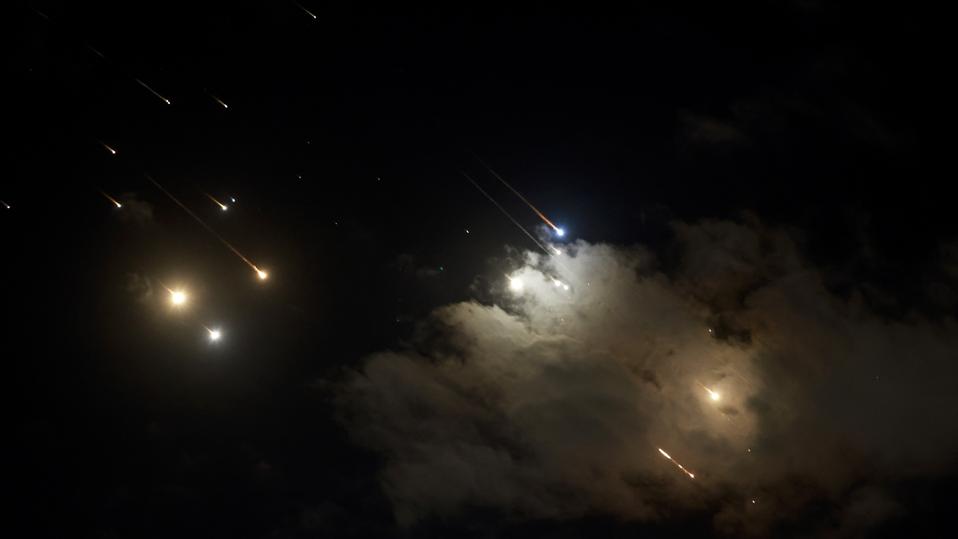The Israeli Defence Forces said Iran fired rockets at Israel just before 1 p.m. EDT—news that comes after the U.S. said it believed Iran was preparing to “imminently” launch missile strikes against Israel, potentially escalating the war in the Middle East.

This picture shows Iranian launched projectiles being intercepted by Israel above Jerusalem, on Oct. 1, 2024.
AFP via Getty Images
Key Takeaways
- The IDF said Iran fired rockets in a post on X, formerly known as Twitter, at 12:35 p.m. EDT.
- In a follow up post, Israel’s military said Israeli civilians are in bomb shelters.
- Iran took responsibility for the attack—and warned it is only a “first wave”—saying it was retaliation for the killings of multiple Hezbollah leaders in a statement read on state television, the Associated Press reported.
- Daniel Hagari, an IDF spokesperson, said around 1:30 p.m. EDT that Israeli authorities believed there were no additional aerial threats from Iran, there were no reports of casualties and that Israel would respond to the attack.
- Airspaces in Jordan and Iraq were closed following the attack, and the Israeli airports authority said its airspace was closed and flights were being redirected, the New York Times reported—though the Israeli airspace reopened around 1:45 p.m. EDT.
- A senior White House official said earlier on Tuesday the U.S. had “indications” Iran would launch a “ballistic missile strike against Israel” imminently, though the scale of the attack wasn’t clear, CNN reported.
- The unnamed official told CNN the U.S. was “actively supporting” preparations to defend Israel against the expected attack, which would carry “severe consequences” for Iran.
Key Background
Iranian officials warned they would retaliate against Israel for a strike last week that killed the longtime leader of Hezbollah, Hassan Nasrallah. Nasrallah was one of at least seven Hezbollah leaders killed in recent weeks as Israel has increased its attacks in Lebanon against Hezbollah.
The attacks increased after Israel’s Security Cabinet updated its objectives of war in mid-September to include “returning [Israeli] residents of the north securely to their homes” amid intermittent Hezbollah strikes from across the border.
As Israel’s attacks have ramped up against Hezbollah—which is largely funded by Iran and has been labeled a terrorist group by the U.S.—so have concerns about the conflict expanding to the wider Middle East. President Joe Biden called for a cease-fire Monday ahead of Israel launching “targeted ground raids” in southern Lebanon, and the United Nations Secretary-General Antonio Guterres said in a statement Tuesday “an all-out war must be avoided in Lebanon at all costs, and the sovereignty and territorial integrity of Lebanon must be respected.”
Crucial Quote
Hours after the attack ended, President Joe Biden said it appeared to be “defeated and ineffective,” which he said was a testament to both the Israeli and U.S. militaries. He went on to say: “Make no mistake, the United States is fully fully fully supportive of Israel.”
Chief Critic
Guterres said in a statement posted to X shortly after Iran’s attack that he condemns “the broadening of the Middle East conflict with escalation after escalation. This must stop. We absolutely need a ceasefire.”
Big Number
10 million. That’s roughly how many civilians were targeted by the Iranian missile strike, the IDF said on X. The IDF later said it believed Iran launched more than 180 ballistic missiles.
Tangent
On Monday, Israel began “targeted ground raids” in a notable escalation of the fighting. The IDF said the raids were “limited, localized, and targeted … in southern Lebanon” against Hezbollah targets and infrastructure, and that the Israeli Air Force and Artillery will also conduct “precise strikes on military targets” in support of the raids.


